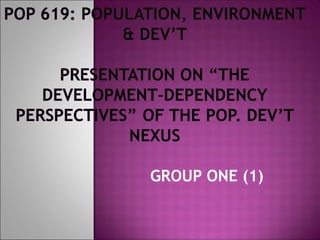
Gp 11 dev't depen. perspt
- 2. The development-dependency perspective, also known as “the dependency theory of development” evolved around 1950 as a reaction to some earlier theories of development. The theory was popular in the 1960s and 1970s as a criticism of modernization theory. The main propounders of dependency theory were: Prebisch, Singer, Paul Baran, Paul Sweezy, C. Furtado, F H Cardoso, Gunnar Myrdal, A Gunder Frank, Girvan, and Bill Warren.
- 3. Dependency theory or “dependencia” theory is a body of social science theories predicated on the notion that resources flow from a "periphery" of poor and underdeveloped states to a "core" of wealthy states, enriching the latter at the expense of the former. It is a central contention of dependency theory that poor states are impoverished and rich ones enriched by the way poor states are integrated into the "world system."
- 4. The theory arose as a reaction to modernization theory which held that today's underdeveloped areas are in a similar situation to that of today's developed areas at some time in the past, and that therefore the task in helping the underdeveloped areas out of poverty is to accelerate them along a supposed common path of development, by various means such as investment, technology transfers, and closer integration into the world market.
- 5. Dependency theory rejected this view, arguing that underdeveloped countries are not merely primitive versions of developed countries, but have unique features and structures of their own; and, importantly, are in the situation of being the weaker members in a world market economy
- 6. Poor nations provide natural resources, cheap labor, a destination for obsolete technology, and markets for developed nations, without which the latter could not have the standard of living they enjoy. Wealthy nations actively perpetuate a state of dependence by various means. This influence may be multifaceted, involving economics, media control, politics, banking and finance, education, culture, sport, and all aspects of human resource-development (including recruitment and training of workers).
- 7. Wealthy nations actively counter attempts by dependent nations to resist their influences by means of economic sanctions and/or the use of military force. Dependency theory states that the poverty of the countries in the periphery is not because they are not integrated into the world system, or not 'fully' integrated as is often argued by free market economists, but because of how they are integrated into the system.
- 8. This perspective collapses all social, cultural and institutional factors that mediate population-environment relationships into the larger concept of 'development‘. It focuses on the way in which development processes mediate population and the environment relations. It lays more emphasis particularly on development trends which have kept the south 'dependent' on the North, e.g. mercantile exploitation and export of natural resources towards manufacturing centers in the North.
- 9. This "dependency perspective" (Jolly 1991) stresses the overwhelming role that common international, political and economic forces play in shaping both demographic factors such as population growth and environmental outcomes such as degradation in developing countries. This approach further suggests that even major global environmental problems (depletion of ozone, greenhouse effects, toxic waste accumulation and loss of biodiversity) are the direct results of the prevailing model of development (Martine 1992 and 1993).
- 10. The concept of dependency is much too vague to be of use, failing to clarify sufficiently the sense in which poor South are dependent on rich North. (O’Brien 1975, p.24) In describing the character of the poor South dependency, their work appears to argue that Third World Countries are static. (Cardoso, 1979) They failed to examine the way in which surplus is extracted through the system of production that prevails in the poor south countries. (Laclau, 1971) They also fail to analyse production relation properly. (Warren,1980,p.170)
- 11. In conclusion the dependency theory arose as a reaction to the modernization theory, which held that all societies progress through similar stages of development by means of technology, investments and closer integration into the world market. However, the dependency perspective stresses the overwhelming role that common international, political and economic forces play in shaping both demographic factors, such as population growth and environmental outcomes such as degradation in developing countries.
- 12. Amin, S. (1976), Unequal Development: An Essay on the Social Formations of Peripheral Capitalism, New York: Monthly Review Press Cardoso, F.H. and Enzo Faletto (1979), Dependency and Development in Latin America, Berkeley CA, California University Press. Jolly, C (1991) Four theories of population change in the environment. Paper presented at Population Association of America Annual meeting, Washington, D.C 21-23 March 1991 Martine, G. (1992). Population, environment and development: key issues for the end-of-century scenario. Paper presented at the Workshop on Population Programme Policies: New Directions, organized by UNFPA and NESDB, Chiang Mai, September,